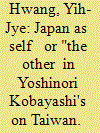| Srl | Item |
| 1 |
ID:
095331


|
|
|
|
|
| Publication |
2010.
|
| Summary/Abstract |
This article is an attempt to demonstrate how and through which social practices Taiwan's past colonial experiences have been discursively produced in a certain way and what other alternatives have been excluded from this process. The article scrutinizes the controversy surrounding a Japanese manga On Taiwan, a book that provides a very positive evaluation of the legacy of Japanese colonialism in Taiwan. Through analyzing statements, utterances, and conducts concerning this manga that were produced by those who have various positions, this article aims to comprehend how the discourses of Japanese colonialism and Sino-chauvinism reciprocally conflict and compete with each other in ways that affect people's self-identification, producing a particular form of subjectivity of Taiwan, while excluding, repressing, and silencing other alternatives.
|
|
|
|
|
|
|
|
|
|
|
|
|
|
|
|
| 2 |
ID:
189497


|
|
|
|
|
| Summary/Abstract |
This article examines the abiding “one China” contention between the People's Republic of China (PRC) and the Republic of China (ROC or Taiwan), focusing on their 2008–2016 cooperation and the ensuing political stalemate. It does so by investigating the PRC's and the ROC's respective legal frameworks and the positions of the major political actors, including the Chinese Communist Party and both Taiwan's Kuomintang and its Democratic Progressive Party. While the PRC maintains its “one-China principle,” and the ROC's legal system retains some “one China” elements, the idea of “one China” has been in flux in Taiwan. The traditional conceptualization of “one China” has been increasingly challenged in Taiwan's democratic era by the rise of a countervailing Taiwanese national identity and opposition to the PRC's insistent agenda to absorb the island. These dynamics are rapidly minimizing the appeal and political utility of any “one China” notions in China–Taiwan relations.
|
|
|
|
|
|
|
|
|
|
|
|
|
|
|
|